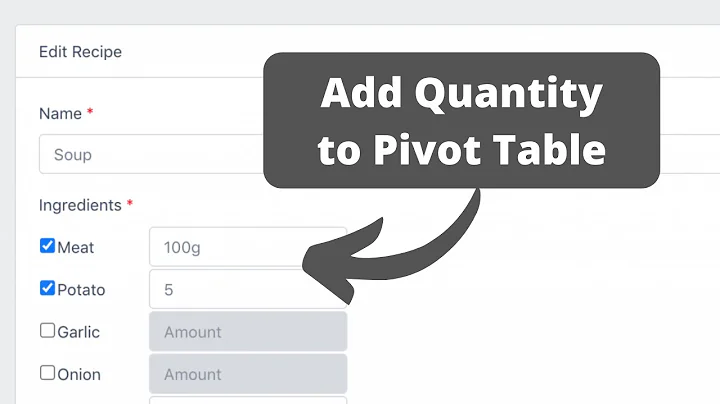Getting count from pivot table in laravel eloquent
Solution 1
Mind that Eloquent uses Query\Builder under the hood, so there is no such thing in Laravel, like 'query eloquent without using query builder'.
And this is what you need:
// additional helper relation for the count
public function ordersCount()
{
return $this->belongsToMany('Order')
->selectRaw('count(orders.id) as aggregate')
->groupBy('pivot_product_id');
}
// accessor for easier fetching the count
public function getOrdersCountAttribute()
{
if ( ! array_key_exists('ordersCount', $this->relations)) $this->load('ordersCount');
$related = $this->getRelation('ordersCount')->first();
return ($related) ? $related->aggregate : 0;
}
This will let you take advantage of eager loading:
$products = Product::with('ordersCount')->get();
// then for each product you can call it like this
$products->first()->ordersCount; // thanks to the accessor
Read more about Eloquent accessors & mutators,
and about dynamic properties, of which behaviour the above accessor mimics.
Of course you could use simple joins to get exactly the same query like in you example.
Solution 2
For future viewers, as of Laravel 5.2, there is native functionality for counting relationships without loading them, without involving your resource model or accessors -
In the context of the example in the approved answer, you would place in your controller:
$products = Product::withCount('orders')->get();
Now, when you iterate through $products on your view, there is a orders_count (or, generically, just a {resource}_count) column on each retrieved product record, which you can simply display as you would any other column value:
@foreach($products as $product)
{{ $product->orders_count }}
@endforeach
This method produces 2 fewer database queries than the approved method for the same result, and the only model involvement is ensuring your relationships are set up correctly. If you're using L5.2+ at this point, I would use this solution instead.
Solution 3
If you already have the $products object, you can do the following:
$rolecount = $products->roles()->count();
Or if you are using eager loading:
$rolecount = $products->roles->count();
Cheers.
Related videos on Youtube
developer34
Updated on June 04, 2022Comments
-
developer34 almost 2 years
I have a many to many relationship for orders and products.
<?php class Order extends Eloquent { public function user() { return $this->belongsTo('User'); } public function products() { return $this->belongsToMany('Product'); } } ?> <?php class Product extends Eloquent { public function orders() { return $this->belongsToMany('Order'); } } ?>Need to fetch the number of times each product is ordered.In mysql,this task can be achieved by using the following query
SELECT products.id, products.description, count( products.id ) FROM products INNER JOIN order_product ON products.id = order_product.product_id INNER JOIN orders ON orders.id = order_product.order_id GROUP BY product_id LIMIT 0 , 30Result of the above query is as follows:-
id description count(products.id) 1 Shoes 3 2 Bag 2 3 Sun glasses 2 4 Shirt 2How this task can be achieved using laravel eloquent (without using query builder)????How can i fetch the number of times each product is ordered using laravel eloquent??
-
developer34 over 9 yearsThe code is working fine and i m getting the desired result now.Thanks for ur help :):) but one more question.Do the function getOrdersCountAttribute() is automatically called when accessing ordersCount() ????Can you explain how these two functions go in flow???
-
Jarek Tkaczyk over 9 yearsheck the edit - added links to the docs, where you can find all you need. Basically accessors/mutators take advantage of magic
__get/__setand let you manipulate model's attributes so they fit your needs. created_at and other timestamps work pretty much the same way. -
developer34 over 9 yearsI completely forgot about the accessors/mutators.Thanks for the reference !!! :):)
-
ElChupacabra over 6 yearsI'd give you +10 if I could. This should be accepted answer.





